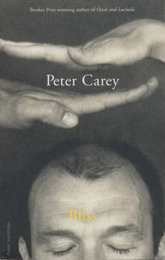
|
Bliss
Paperback
Main Details
| Title |
Bliss
|
| Authors and Contributors |
By (author) Peter Carey
|
| Series | Faber Fiction Classics |
|---|
| Physical Properties |
| Format:Paperback | | Pages:368 | | Dimensions(mm): Height 176,Width 111 |
|
| Category/Genre | Modern and contemporary fiction (post c 1945) |
|---|
| ISBN/Barcode |
9780571209798
|
| Classifications | Dewey:823 |
|---|
| Audience | |
|---|
|
Publishing Details |
| Publisher |
Faber and Faber
|
| Imprint |
Faber and Faber
|
| Publication Date |
9 April 2001 |
| Publication Country |
United Kingdom
|
Description
This novel, by the author of "Oscar and Lucinda", tells the story of a man who, recovering from death, is convinced that he is in hell. For the first time in his life, Harry Joy sees the world as it really is, and takes up a notebook to explore and note down the true nature of the Underworld.
Author Biography
Twice winner of the Booker Prize, Peter Carey's most recent novel Parrot and Olivier in America was described by the New Yorker as 'a comic masterpiece' and by the Sunday Times as 'an exhilarating tour-de-force'. It was shortlisted for both the Man Booker Prize and a National Book Award in 2010.
ReviewsKirkus Review US:Harry Joy is 39, an ad-man in an unnamed Australian city, who while mowing his lawn one day has a heart attack and dies. Then, nine seconds later, his heart re-catches and he's again alive. But in the meantime, temporarily dead, he's learned a few things. One, that there are such distinct and immutable qualities as Good and Evil; two, that the principalities of Heaven and Hell ("worlds in the afterlife like layer after layer of file pastry") do actually exist. And, in fact, it seems to Harry that he hasn't in fact come back to life but that he has indeed entered Hell. How else to account for frustrated wife Bettina's affair with Harry's partner? Or his daughter Lucy being a Communist? Or his son David being a rapacious money-hungerer with dreams of being a drug-dealer? All these people, Harry figures, must be "Captives" of Hell themselves, "Actors" who've accommodated themselves to do and be dirty in order to please "Those In Charge." And when he returns to the ad agency and proceeds to dismantle it, purging the evil (dropping oil company clients, first off), these same family Captives promptly have him committed to a mental hospital: "Sometimes he saw, the doors had signs such as 'Social Workers' instead of 'Station Master' or 'Waiting Room' but there was, amongst the people he saw, the same melancholy one finds amongst passengers who have just missed the train to the city and know they will be marooned here for the next four hours." But Harry stays minimally afloat - thanks to the presence of a hippie and part-time whore named Honey Barbara. And when they're both released, she and Harry decide to go home to Harry's house - to brood and try to change Hell from within. Carey (The Fat Man In History) handles the impressive and unsettling situation here - the ethical reversals - with deft, cool talent, especially in a raft of very funny (rageful) family scenes. Yet underlying the whole novel is a rather simpleminded message: an ecological cautionary tale in which the villains - advertising, cities, cars - are knocked down stylishly but with little cumulative effect. The first half, then, with its sheen and style, may remind you of Walker Percy and/or Thomas Berger, while the second half drags and repeats. But, even if erratic, this is strong work from a big, growing talent. (Kirkus Reviews)
|